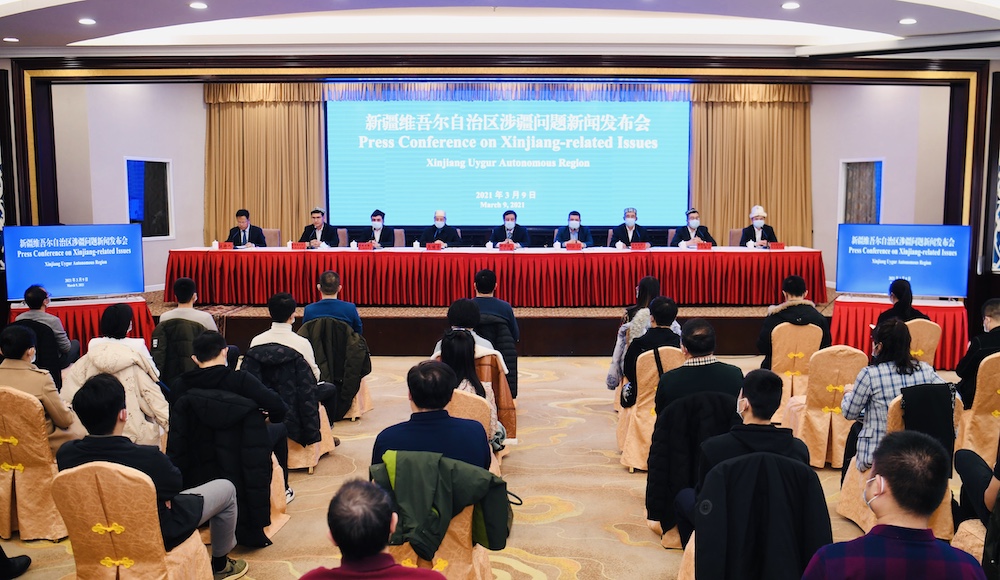
Photo taken on March 9, 2021 shows the press conference held in Urumqi, capital of northwest China's Xinjiang Uygur Autonomous Region. Photo by Wang Zhen
On March 9, 2021, the Information Office of the People's Government of Xinjiang Uygur Autonomous Region held the 24th press conference on Xinjiang related issues. The press conference invited the Spokesperson of the Information Office of the People’s Government of XUAR Elijan Anayit and religious circles.

Host of press conference: Deputy Head of the Publicity Department of the CPC Xinjiang Committee Xu Guixiang. Photo by Wang Zhen
Xu Guixiang: Dear friends from the media, good afternoon. Welcome to the press conference on Xinjiang-related issues.Today, we are very happy to have the Spokesperson of the Information Office of the People’s Government of XUAR Elijan Anayit and religious circles. We would like to invite them to answer questions from you.
China National Radio of China Media Group: Some overseas media claimed that Chinese government has demolished mosques in Xinjiang and destroyed religious places of the Uygur Muslims. What is your comment on it?
Xu Guixiang: The first question goes to Abuduwaili Abulimiti, the president of the Islamic Association of Shache County in Kashgar Prefecture and the hajib of Aletun Mosque in Shache town.

Abuduwaili Abulimiti, the president of the Islamic Association of Shache County in Kashgar Prefecture and the hajib of Aletun Mosque in Shache town. Photo by Wang Zhen
Abuduwaili Abulimiti: My name is Abuduwaili Abulimiti. I am the president of the Islamic Association of Shache County in Kashgar Prefecture and the hajib of Aletun Mosque in Shache town.
I have never heard of any cases about the demolition of mosques and the destruction of religious places. I have learned that most mosques in Xinjiang were built in the 1980s-90’s or even earlier and originally were Adobe houses. Some of them were very narrow and small, some had become dangerous houses, and religious activities were unable to be carried out normally there in case of windy and rainy days. In case of an outbreak of earthquake, the safety of Muslim people would be seriously threatened. In addition, some of mosques could not provide a convenient place for Muslims to carry out religious activities for their unreasonable layout. In recent years, in pace with the speeding urbanization and the implementation of the rural revitalization strategy, some local governments, in response to the appeal and application of local Muslims, have well solved the problem of dilapidated houses in mosques. In accordance with urban and rural construction planning, the local governments work on the solution in combination with urban shantytowns transformation, rural living environment improvement, relocation for poverty alleviation etc., and have taken various measures involving new construction, relocation, expansion etc. At present, with safer houses and more reasonable layout, the mosques in Xinjiang can fully meet the needs of religious people.
Like other mosques, Aletun Mosque where I am serving, has land use certificate, property certificate, and registration certificate of religious place granted by concerning governmental departments, and the rights of our mosque are guaranteed in accordance with the law. The mosque has a history of more than 480 years, covering an area of more than 2600 square meters. The prayer hall of the mosque can accommodate 300 worshipers at the same time. In 2006, it was listed as a national key cultural relics protection unit, and the state also allocated special funds for repair and preservation. Now the mosque has spacious and bright halls with clean and tidy rooms, making a beautiful environment. The conditions are particularly good, which greatly facilitates the Muslim people around and they are very satisfied.
Xu Guixiang: Thank you for your answer. Please go ahead to raise questions, media friends.
Tianshannet: Some overseas media claimed that religious places and religious activities in Xinjiang should be approved by the Religious Bureau and that religious activities are under restriction. What’s your comment on it?
Xu Guixiang: This question goes to the Spokesperson of the Information Office of the People’s Government of XUAR Elijan Anayit.

Elijan Anayit, the Spokesperson of the Information Office of the People’s Government of XUAR. Photo by Wang Zhen
Elijan Anayit: In accordance with The Regulations on Religious Affairs in Xinjiang Uygur Autonomous Region, The Religious Affair Department of the government registers the places of religious activities in accordance with the law in order to give them legal status and protect their legitimate rights and interests. The Regulations clearly stipulates that religious places enjoy the rights to establish their democratic administration, manage their interior affairs, carry out religious activities, accept donations, manage and use their property, and initiate good causes under the rule of law. The legitimate rights and interests of places for religious activities shall be protected by law and shall not be infringed upon or interfered with by any organization or individual. Religious faculty members have the right to preside over religious activities and religious ceremonies, and can accept donations from society and individuals. All normal religious activities conducted by citizens in places of religious activities and in their own homes in accordance with religious customs, such as prayer, fasting and religious festivals, are taken care of by religious organizations and citizens themselves and protected by law. No organization or individual are allowed to interfere. There is no such case that religious activities are under restriction, as is claimed by overseas media.
Today we have invited Asilihan Nazha’erhan, the Imam of the mosque in Hongdun Town Altay City, to be present here. Now he will talk about how the religious activities are carried out in his mosque.
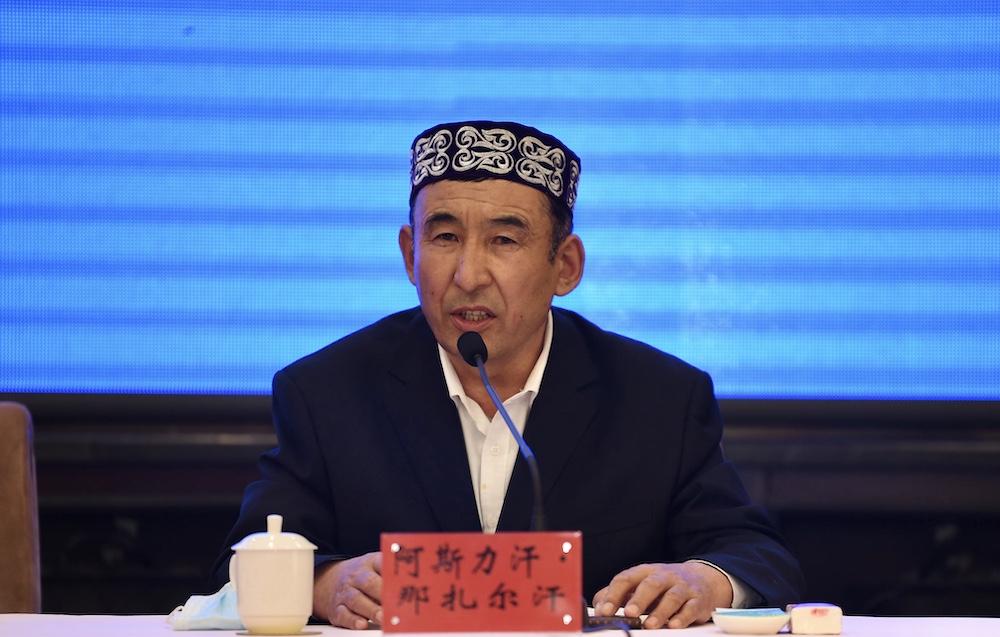
Asilihan Nazha’erhan, the Imam of the mosque in Hongdun Town Altay City. Photo by Wang Zhen
Asilihan Nazha’erhan: My name is Asilihan Nazha’erhan, a Kazak. I am 56 years old this year. I have been chairing the position of Imam in the mosque in Hongdun Town Altay City for 25 years. Speaking from what I have seen and heard, the problem of “religious activities are under restriction” doesn’t exist in Xinjiang.
Taking the mosque in Hongdun Town for example, the mosque was built in 1996, covering an area of more than 1500 square meters and a building area of nearly 200 square meters. Now about 100 people every day come to the mosque to attend five times of prayer and there are more people on Sunday, about 200 people. More people come to the mosque during the two festivals. They are all residents around the mosque in Hongdun Town. After the Muslims around get the marriage certificate from the Civil Affair Department of the government, they will invite me to their homes to preside over the Nicah ceremony. When someone passes away, I will got to the Muslim funeral service center to hold a standing ceremony for the dead according to religious customs, and then the dead is buried in the cemetery. In Xinjiang, the government protects normal religious activities according to law and fully respects Muslims’ customs.
The statement claimed by some overseas media that religious activities are under restriction in Xinjiang is sheer nonsense. Their sinister purpose is to stir up the dissension between the government and us, create contradictions between Muslims and non Muslims, and destroy our happy life. We will never be deceived!
Xu Guixiang: Thank you for your answer. Please go ahead to raise questions.
China Daily: Some overseas media think that some religious people disapproved by government in Xinjiang have been held in custody. Is that really the case?
Xu Guixiang: This question goes to Lutipula Abudureyimu, the Imam of Tuofuqia Mosque of Yiliqi Township Hotan City.
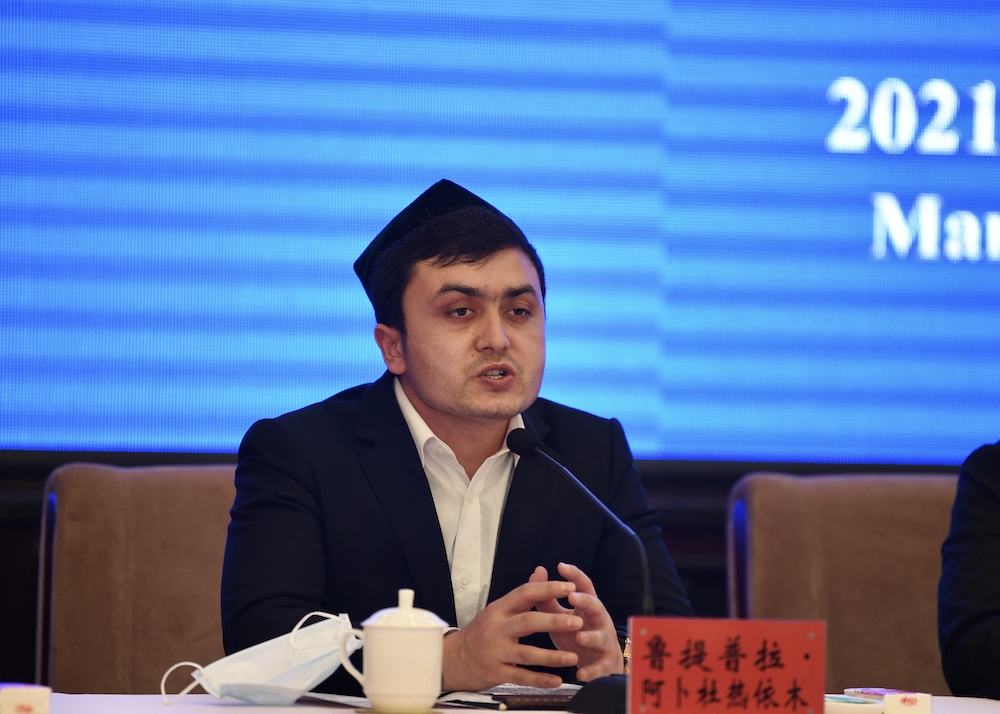
Lutipula Abudureyimu, the Imam of Tuofuqia Mosque of Yiliqi Township Hotan City. Photo by Wang Zhen
Lutipula Abudureyimu: My name is Lutipula Abudureyimu, and I am the Imam of Tuofuqia Mosque of Yiliqi Township Hotan City.
As far as I know, those so called religious personnel held on custody by government are not religious faculty staff at all. They are criminals who spread religious extremism and are engaged in separatist, destructive and violent terrorist activities in the name of Islam. Taking advantage of the simple religious feelings of Muslims, they spread extreme ideas, wantonly distorted the teachings and rules of Islam, denied all secular ideas and achievements of modern civilization, advocated “to go to heaven through jihad martyrdom”, and persecuted “heretics” and “traitors”. Some religious people with good faith were rejected, persecuted and even murdered by them. For example, Under the influence of religious extremism, there were thousands of violent and terrorist cases in Xinjiang for a period of time, causing a large number of innocent people to be killed. Even a group of highly respected Islamic figures, such as Aronghan Aji, Maulvi Younus sidik, Juma Tayi’er etc., were brutally killed by them. These extreme behaviors have brought great disasters to the people of all ethnic groups in Xinjiang, including Muslims, and also greatly damaged the image of Islam.
Let’s watch the surveillance video of the murder of Juma Tayi’er committed by terrorists first.
China is a country ruled by law. The government cracks down on all kinds of illegal and criminal activities in accordance with the law, and the illegal and criminal activities carried out by using religions are no exception. In the combat against crime, there has never been a specific religion that has been directed against. We all believe that although religious extremism is holding the banner of Islam it is totally contrary to religious doctrines. It is not Islam. In fact, it is a tumor of anti-humanity, anti-society, anti-civilization and anti-religion. It is essentially different from the doctrines of patriotism, peace, unity, middle way, tolerance and goodness advocated by Islam and other religions. In my opinion, combating religious extremism is to better protect legitimate religions. Now there have been no violent terrorist cases in Xinjiang for more than four consecutive years. We religious people feel very safe and firmly support the measures taken by the government.
Xu Guixiang: Thank you for your answer. Please go ahead to raise questions.
XinJiang Daily: What channels do Xinjiang Muslims have to acquire religious knowledge?
Xu Guixiang: This question goes to Ma Jirong, the vice president of Islamic Association Yili Prefecture and Imam of Shaanxi Grand Mosque of Yining City.
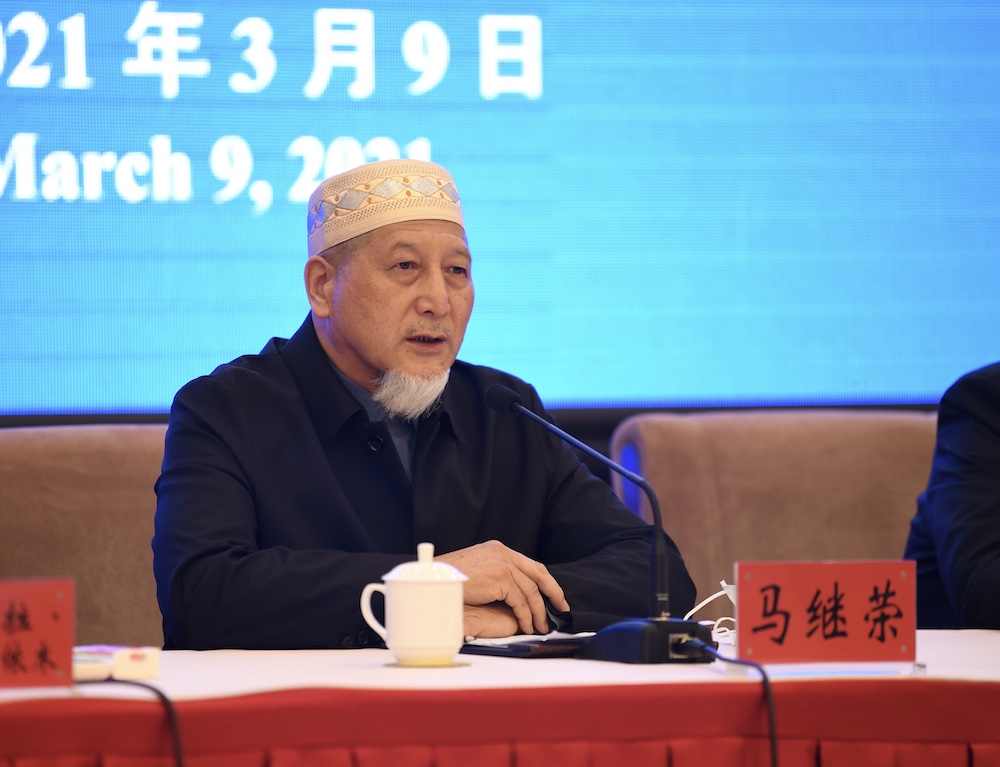
Ma Jirong, the vice president of Islamic Association Yili Prefecture and Imam of Shaanxi Grand Mosque of Yining City. Photo by Wang Zhen
Ma Jirong: My name is Ma Jirong. I am the vice president of Islamic Association Yili Prefecture and Imam of Shaanxi Grand Mosque of Yining City.
We Muslims have access to religious knowledge mainly through the four channels as is followed:
Firstly, studying at mosque. Muslims acquire religious knowledge from religious teachers’ lecturing. Taking me as example, I have been engaged in religious teaching since I was 25 years old. At the beginning, I learned from Imam of mosque. For example, I often lecture about The Koran, The Essence of Buhari’s Sermon and religious rituals to Muslims, teaching them how to do religious services and how to read religious scriptures correctly etc.. In our Shaanxi Grand Mosque, there is a library with a collection of over 2000 books on religion, history and culture. They are open to Muslims all day long.
Secondly, studying in religious institutions. At present, there are 10 Islamic institutions in Xinjiang, including Xinjiang Islamic Institute, 8 branches of Xinjiang Islamic Institute in Ili, Urumqi, Hotan and Kashgar, and Xinjiang Islamic School of Scriptures. The courses offered involve the following subjects: religious knowledge, such as Islamic Dogmatics, ilm al-hadith, Koran recitation, etc.; knowledge of law and regulations, such as constitution, civil law, religious affair regulations, de-radicalization regulations etc.; cultural and historical knowledge, such as the history of China, national standard language, Islamic history and culture, computer, Arabic etc.; Muslims who meet the requirements can come to study. For example, in 2006, I studied in China Islamic Institute. I learned Islamic classic thoughts, doctrines, religious rituals, religious classics and other religious knowledge. I also read a lot of Islamic classics in my spare time, which further improved my religious knowledge and level.
Thirdly, reading religious classics. Xinjiang Islamic Affair Steering Committee has managed the translation and publication of religious classics in 4 languages--Chinese, Uygur, Kazak, and Kirgiz, such as The Koran, The Essence of Buhari's Sermon, and so on, and compiled and printed A Collection of Woltz’s speeches, which are provided for our religious staff to use.
Fourthly, studying through periodicals and websites. Islamic Association of China has its own website and periodical, China Muslim, which provide a platform and channel for Muslims to have access to religious knowledge. The ways of learning religious knowledge are various, and the channels are smooth and can meet the Muslims’ needs of learning religious knowledge.
Now, let’s watch a video of religious falcuty staff cultivation in Yili Branch of Xinjiang Islamic Institute.
Xu Guixiang: Thank you for your answer. Next question.
Xinjiang Broadcasting and Television Station: Some overseas media claimed that Xinjiang suppresses the religious belief of local Muslims. Is that really the case?
Xu Guixiang: This question goes to Maimaitiyiming Maimaitirouzi, the Hajib of the New Akeya Mosque of Kezile’agen Villege Bayinkuluti Township Wuqia County Kizilsu Kirgiz Autonomous Prefecture.

Maimaitiyiming Maimaitirouzi, the Hajib of the New Akeya Mosque of Kezile’agen Villege Bayinkuluti Township Wuqia County Kizilsu Kirgiz Autonomous Prefecture. Photo by Wang Zhen
Maimaitiyiming Maimaitirouzi: My name is Maimaitiyiming Maimaitirouzi. I am the Hajib of the New Akeya Mosque of Kezile’agen Villege Bayinkuluti Township Wuqia County Kizilsu Kirgiz Autonomous Prefecture. The statement claimed abroad that Xinjiang suppresses the religious belief of local Muslims is a pure fabrication and malicious smear.
For example, the New Akeya Mosque where I have been serving was built in 1998 and the villagers around all come here to do religious service. In recent years, the conditions of places for religious activities have been continuously improved. Now the mosque has air conditioning when it’s hot and has heating when it’s cold. It also has a flushing toilet and a bathroom for religious cleaning. The conditions are very good. The religious people in our village carry out normal religious activities in mosques and in their own homes according to their own wishes, without any interference or restriction.
The channel for Muslims to learn Islamic knowledge is very smooth. They can study in mosques, religious institutions, or they an study through reading religious classics, magazines and online learning. For example, I studied in Xinjiang Islamic Institute for five years. During my study on the campus, I learned some religious knowledge, involving The Koran chanting, The Essence of Buhari's Sermon, Islamic doctrines and rituals etc. In my spare time, I also read a large number of Islamic classics, mastering religious learning and acquiring the ability to serve the religious masses. Now, on every Sunday and the "two festivals", I give lectures to Muslims through A Collection of Woltz’s speeches, explaining the Scriptures and teaching Islamic knowledge. Xinjiang Islamic Affair Steering Committee has managed the translation and publication of religious classics in 4 languages--Chinese, Uygur, Kazak, and Kirgiz, such as The Koran, The Essence of Buhari's Sermon, and so on, which makes it convenient for Muslims to learn.
Truth can not turn into lies and vise versa. Here I would like to say if what the overseas media said were true, could the conditions of our mosque be so good? Could we Muslims carry out religious activities normally? Could I study in Xinjiang Islamic Institute? Those overseas media are just busy with slandering and spreading rumors, and stirring up enmity all day long. Their lies can’t deceive others. We can see clearly their plot to disrupt Xinjiang.
Xu Guixiang: Thank you for your answer. Next question.
CNS: Thank you the host. Does Xinjiang prohibit Muslims’ fasting, as is reported by some western media?
Xu Guixiang: This question goes to Taxitiemu’er Kade’er, the Imam of Peace Mosque of Shayibake District Urumqi City.
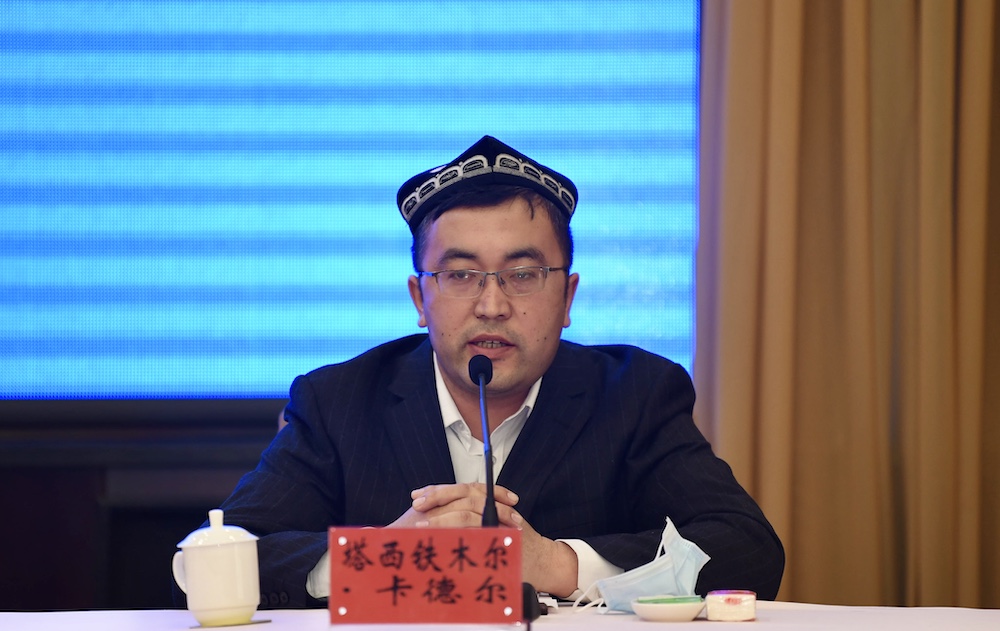
Taxitiemu’er Kade’er, the Imam of Peace Mosque of Shayibake District Urumqi City. Photo by Wang Zhen
Taxitiemu’er Kade’er: My name is Taxitiemu’er Kade’er. I am the Imam of Peace Mosque of Shayibake District Urumqi City. I have been serving as the Imam at Peace Mosque for 12 years.
Fasting is one of the five merits of Muslims. Fasting and Eid-al-Fitr are normal religious activities of Muslims of all ethnic groups, which are carried out in full accordance with their personal wishes, protected by law, and have never been interfered by anyone. During Ramadan, Muslims of all ethnic groups in Xinjiang observe the Islamic tradition of fasting in the morning and dieting in the evening. For example, my mother and my wife fast every year during Ramadan, and my wife prepares fasting meals for us every day.
During Ramadan, Muslims around Peace Mosque attend five services a day. Some go to the mosque, and some do it in their own homes. They do Salat-al-Tarawih at the mosque after the night service. For the convenience of Muslims, the mosque also provides tea, Naan, fruits and other food for fasting people. In Ramadan 2020, the government specially arranged medical staff to provide medical services and epidemic prevention materials for the mosque, and our daily religious activities were normally held.
Xinjiang government also expressly stipulates in documents that the people of all ethnic groups in Xinjiang enjoy a day off on Eid-al-Fitr. The government should guarantee the market supply of various household goods with reasonable price. Every family usually cook Sanzi, oil cakes and other delicious food, making preparations to treat relatives friend who pay a festival visit. On the day of Eid, Muslims of all ethnic groups go to the mosque to attend the ceremony and celebrate the Eid-al-Fitr. After the ceremony, people usually visit the elders, neighbors and friends to celebrate the festival, expressing their greetings and good wishes to each other. The festival atmosphere is very strong and lively.
Some western media say that Xinjiang prohibits Muslims’ fasting. This is sheer slander and smear. According to the The Koran, you will know to whom the punishment of humiliation comes and who the liar is (11:93). These rumors spread by Western media are totally fallacies fabricated out of air to confound the right and wrong. Their sinister purpose is to stir up the dissensions among ethnic groups in Xinjiang and deliberately create the antagonism between China and the Islamic countries. The evil act of stirring up enmity is extraordinarily despicable.
Now, let’s watch a video of local Muslims’ fasting in Aksu Prefecture, Kizilsu Prefecture and other places.
Xu Guixiang: Thank you for your answer. Next question.
Xinhua News Agency: Xinjiang is a region where many religions coexist, and many ancient religious books have been handed down in history. In what ways are those ancient religious books in Xinjiang preserved?
Xu Guixiang: This question goes to Ablet Aysan,the director of the national planning office of collection sortation publication of Minorty Ancient Books in Xinjiang Uygur Aoutonomous Region.
Ablet Aysan: Xinjiang attaches great importance to the preservation, census, rescue, collection, collation, translation, publication and research of ancient religious books. In September 1983, a leading group for planning the collection, collation and publication of ancient books of ethnic minorities in Xinjiang Uygur Autonomous Region was established, and an office was set up in the Ethnic Affair Committee (Bureau of Religious Affairs) of Xinjiang Uygur Autonomous Region, specializing in the collection, preservation, collation and publication, publicity and promotion of ancient religious books. Over the past 30 years, the central government and the government of Xinjiang Uygur Autonomous Region have allocated tens of millions of yuan for the collection, registration, collation and publication of ancient religious books, which has effectively preserved a large number of representatives of ancient religious books with important edition value. In 2016, Xinjiang built a special library, equipped with constant temperature and humidity equipment and fire fighting and safety facilities in line with national standards. In 2019, Xinjiang carried out digital scanning on the ancient religious books, and transformed the original ancient books into electronic data form, further strengthening the preservation, research and utilization of ancient religious books.
Up to now, Xinjiang has collected and registered more than 2000 Islamic classics and manuscripts, and ancient books of lithographic printing, typographic printing, and photocopying, including The Koran, The Essence of Buhari's Sermon, The Biography of the Prophet, The Biography of Muhammad, and A story of Id al-Mi'raj etc. in Arabic, Persian, Chagatai three languages. Among them, the manual copy of The Biography of the Prophet has a history of 230 years. The classic manuscripts of Buddhism, such as Mahayana Sutra of Five Guardians, Sutra of Vajra Prajna Brahmaputra, etc., were collected and sorted out. The ancient books such as The Biography of the Prophet, the Story of Amir Aba Muslims etc. have been sorted out and published. Eight ancient books, including The Biography of the Prophet, The Biography of Muhammad etc., are included in the list of precious ancient books of the state.
Now let’s watch a video of preserving ancient religious books in Xinjiang.
Xu Guixiang: Thank you for your answer. Next question.
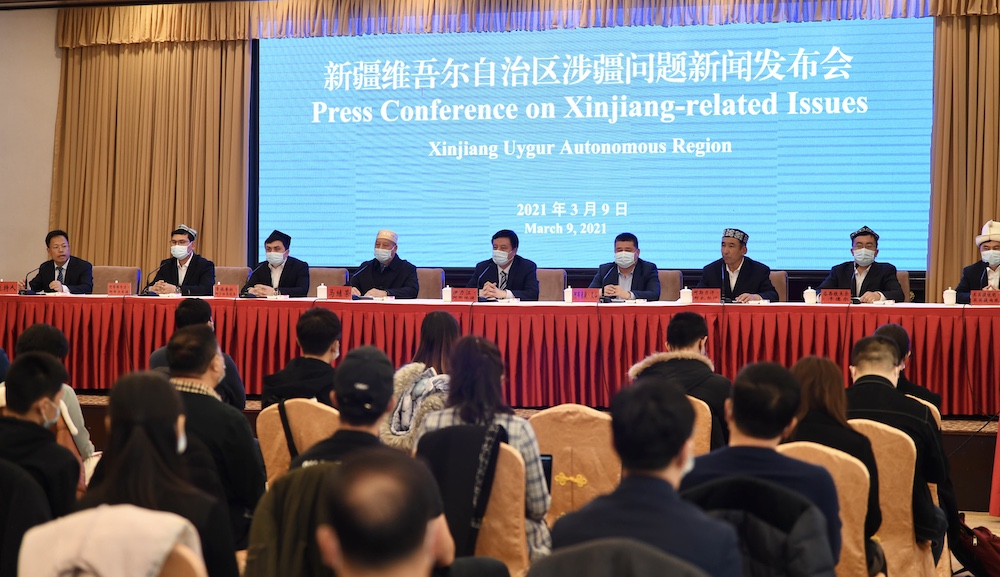
Photo taken on March 9, 2021 shows the press conference held in Urumqi, capital of northwest China's Xinjiang Uygur Autonomous Region. Photo by Wang Zhen
CGTN: Adrian Zenz, in the published article, Beyond the Camps: Beijing’s Long-Term Scheme of Coercive Labor, Poverty Alleviation and Social Control in Xinjiang, claiming that there’s “forced labor” in Aksu Prefecture’s Huafu Color Spinning Corporation, Shache County’s Eagle Textile Company, Xinjiang Meili’ao Fashion Corporation, Xinjiang Jinfuzhen Clothing Corporation, and Kashgar Tashkorgan County’s Jinfuyuan garment factory. What’s your opinion on this?
Xu Guixiang: This question goes to Spokesperson of Information Office of the People’s Government of XUAR Elijan Anayit.
Elijan Anayit: Adrian Zenz is a member of the far right group established by the US government, and a senior member of anti-China research institution set up and manipulated by the U.S. intelligence agencies. He is living on making up lies on Xinjiang affairs and slandering China. There’s no “forced labor” in Xinjiang’s enterprises. Based on the principle of equality and voluntarily, laborers of all ethnics sign labor contracts with employers and get legal payments in accordance with China's labor law and regulations. There is no discrimination against workers on the basis of ethnicity, region, gender, and religious belief. Through investigation, like all the other enterprises in Xinjiang, there’s no “forced labor” in Aksu Prefecture’s Huafu Color Spinning Corporation, Shache County’s Eagle Textile Company, Xinjiang Meili’ao Fashion Corporation, Xinjiang Jinfuzhen Clothing Corporation, and Kashgar Tashkorgan County’s Jinfuyuan garment factory. Truths of labor employment of Xinjiang’s ethnic minorities have been presented in the Investigation Report on the Employment of Xinjiang’s Ethnic Minorities and the Report on Social Responsibilities of Xinjiang’s Cotton Textile Industry, both reports give powerful responses to the lies of Xinjiang’s “forced labor”. I hope all of you firmly choose to stand by facts and resolutely say “no” to lies.
Xu Guixiang: Today's press conference concludes now. Thanks all the media friends.








